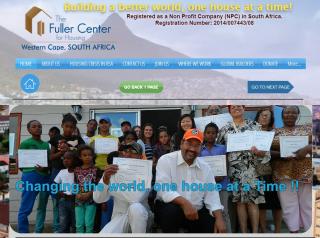The Fuller Center for Housing Western Cape (FCHWC)

26 Bree Street, Peerless Park East, Kraaifontein
7570 Cape Town
Afrique du Sud
Personne de contact: Bishop Louis Michael Green
+ 27 60 679 3070
WhatsApp only: +1 678 851 8219
fuller.wcape.green@gmail.com
louisgreen69@gmail.com
https://www.fchwc.org
https://fullerwcapegreen.wixsite.com/fchwc
Les Thèmes
- Organisation d'aide
- Communauté, projet communal
- Droits de l'Homme
- Bénévoles sont les bienvenus.
Qui sommes-nous
The Fuller Center for Housing Western Cape (FCHWC), South Africa, is a faith-driven and Christ-centered housing nonprofit organization.
The ORGANIZATION started its working in 2014 after the concept of the Fuller Center for Housing in Americus Georgia, the USA which is committed of building homes for the homeless at no interest and no-profit basis.
It is our vision to end poverty housing in South Africa and to become a successful Christian based, nonprofit housing organization in South Africa, but in particular, the Western Cape, which will make a significant difference in the lives of thousands of indigent families in the Western Cape seeking for decent, affordable housing.
Our one and only mission is to end the shame and disgrace of poverty housing and homelessness in Cape Town and the Western Cape in particular, and the new South Africa in general, by ensuring that every family has a decent and affordable home - a place in the sun for everyone.
We believe in the slogan: "Changing the world, one house at a time."
FOUNDATIONAL PRINCIPLES OF FULLER HOUSING CENTER, WESTERN CAPE, SOUTH AFRICA
We at the Fuller Center for Housing Western Cape South Africa believe that:
We have been called to this housing ministry; we didn't just stumble into it.
We are unashamedly Christian
and enthusiastically ecumenical.
We aren't a church but we are a servant of the Church.
We are faith-driven, knowing that after we've done all we can do the Lord will help finish the job—something that requires us to stretch beyond our rational reach.
We are a grassroots ministry, recognizing that the real work happens on the ground in communities around the world through our covenant partners, so a large, overseeing bureaucracy isn’t needed.
We try to follow the teachings of the Bible and believe that it says that we shouldn't charge interest of the poor, so we don't.
The government has a role in our work in helping set the stage, but that we shouldn't look to it as a means to fund the building or improvement of our homes.
We commit ourselves to wipe out the disparities in housing in the Western Cape, first, and to restore many families by providing basic, decent, affordable housing to families who are homeless or who live in sub-standard housing.
Our work
We will promote collaborative and innovative partnerships with individuals and organizations in an unrelenting quest to provide adequate shelter for all people in need worldwide in general, but more specific in South Africa, the Western Cape.
We are a grassroots ministry, recognizing that the real work happens on the ground in communities around the world through our covenant partners, so a large, overseeing bureaucracy isn’t needed.
We try to follow the teachings of the Bible and believe that it says that we shouldn't charge interest to the poor, so we don't.
The government has a role in our work in helping set the stage, but that we shouldn't look to it as a means to fund the building or improvement of our homes.
Phases of the building program:
• Phase 1: A needy family is selected based on the criteria decided by the Board of Directors of the FCHWC.
• Phase 2: An agreement is drawn up between the family and the FCHWC, whereby FCHWC commits itself to provide the material and technical guidance to construct the
Brick or wooden house and the family members agree to commit their time (sweat equity) to complete the house (brick or wooden framed).
• Phase 3: A Project Plan with the plan of the house is drawn up and a project and construction manager (who will supervise the building program) is appointed in
consultation with the needy family. The Project manager and all other expertise are volunteers.
• Phase 4: The building site is marked out with profile planks to indicate the size of the house.
• Phase 5: Involves on the job training of our volunteers when construction starts. We collect all building rubble in people’s yards and use it as filling to
prepare for the cast of a concrete slab at least 75mm thick;
• Phase 6: We order the building material (sand, stone, and cement) and hire a concrete mixer to cast the floor slab under the guidance of the construction
manager.
• Phase 7: During this phase, the outside walls (perimeter) of the house are built plumb and square with bricks or construction timber;
• Phase 8: During this phase, if the house is wooden-framed, we clad the wooden wall frames with thermal plastic, and the frames are covered with fiber cement
boards up to roof height, which is an ideal covering for protection against the harsh winters of the Western Cape.
Phase 9: The building and erection of roof trusses, usually on-site, and sometimes off-site if the trusses are too many to build, in one or two days.
The Orange Angels is a well-organized group of volunteers of builders in Cape Town, South Af
For other net participants, we can offer expert guidance through trained staff, give an expert opinion, procure expert information and establish new contacts in the field of our work, especially construction work for indigent families.
